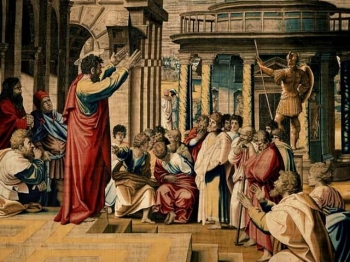It is fundamental to establish the Church’s priority to announce Christ
 St. Paul’s preaching in Athens symbolizes the missionary enthusiasm that animates the Church throughout the centuries.
(St. Paul preaching in Athens – Raffaello Sanzio)
St. Paul’s preaching in Athens symbolizes the missionary enthusiasm that animates the Church throughout the centuries.
(St. Paul preaching in Athens – Raffaello Sanzio)
Guillermo Macías Graue, Lieutenant of the Order for Mexico, wrote to the Grand Master with regards to his Lectio Magistralis for the inauguration of the academic year at Rome’s Pontifical Athenaeum Regina Apostolorum on "Evangelization and missionary spirit". During the lockdown Pope Francis in one of the morning homilies recalled that "faith is either missionary or it is not faith" and the Grand Master’s contribution builds on this thought. The interest in this text prompted Cardinal Filoni to propose a summary of it below in the light of the World Mission Sunday held on October 18 on the theme "Here am I, send me" (Is 6: 8).
The first missionary, in the sense of someone who leaves one's own certainties and land to announce Jesus Christ, was Saint Paul. While the other Apostles evangelized in the Jewish sphere, with his three apostolic journeys, Paul gave ample scope to his missionary work in the Mediterranean, which at the time was under the dominion of Rome. With him, evangelization took on a 'missionary' feature: that is, open to the people; in this way there was a shift from a preaching restricted to the Jewish sphere, to that open to pagans; the Church of the peoples was born, the Church of the pagans with a universalistic, Catholic vision. The preaching of the unknown God, which Paul brought to Athens and then to Rome, still allows us to see in him the enthusiasm, beauty and determination in bringing the Gospel: "For when I preach the gospel, I cannot boast, since I am compelled to preach - he wrote to the Corinthians - Woe to me if I do not preach the gospel!" (1 Cor 9:16). This may perhaps appear to some a subtlety; on the other hand, I consider it a very appropriate, lexical and necessary distinction in a time of confusion.
Evangelization is the task of all the baptized and involves giving an account of our faith, especially with the witness of our life; missionary spirit is the generous and constant commitment which, in the context of evangelization, adds a specific willingness: that of announcing the Gospel wherever the name of Jesus has not been proclaimed, the bearer of God's blessing and the grace of the Gospel.
Establishing the priority of announcing Christ is fundamental in the Church. Without this announcement, which should - at least in intention - accompany all other forms of outreach, the Church loses its missionary nature and places itself on the same level as organizations with various kinds of purposes, be they humanitarian, civil or religious. The centrality of announcing the Gospel is fundamental, particularly in an era when we witness its decline across all ecclesial levels, or worse, its being relegated to the margins in favour of social and civil factors, albeit of great importance. The announcement is the centre and the end is Christ.
The inclusion of the laity in missionary life represents a growing novelty; men and women and even families more and more often allow themselves to be involved in the missionary commitment, bringing with them, beyond the variety of professional skills, the witness of life and a new approach to proclaiming the Gospel and encountering Christ.
The announcement of the risen Christ must be lived by making eschatological tension the root of a faith and charity animated by hope and, for this reason, capable of a witness of fraternal, merciful and solicitous life for the good of all. Against all discouragement, it must be kept in mind that no transmission of the Gospel of Jesus would be possible if the Word and the Holy Spirit were not the first witnesses of the Gospel. In its announcement by the Church and Christians, the Holy Spirit remains the transcendent protagonist of the realization of this work in mankind and in the history of the world; "The Holy Spirit is indeed the principal agent of the whole of the Church's mission." (Redemptoris Missio 21).
The Church needs to rediscover this trust in Her mission, that is, to be clear that she is the "Body of the Risen Lord" cf. CCC, 787 et seq.), sometimes wounded by violence and persecuted, but always the bearer of a gift for the human race, of a spiritual and moral mission to be an instrument of peace, of union between peoples, without ideological and political calculations; above all an instrument of salvation for the human being overwhelmed by inner restlessness, changes and imbalances, but also by violations of our own dignity. Evangelization and missionary spirit cannot be disguised; they are an expression of life. The Church that announces is always the space of grace in which God, who gifts and who gives, goes to meet humanity.
We need to put Her evangelizing and missionary identity back at the centre of the Church.
Fernando Cardinal Filoni
(November 2020)



